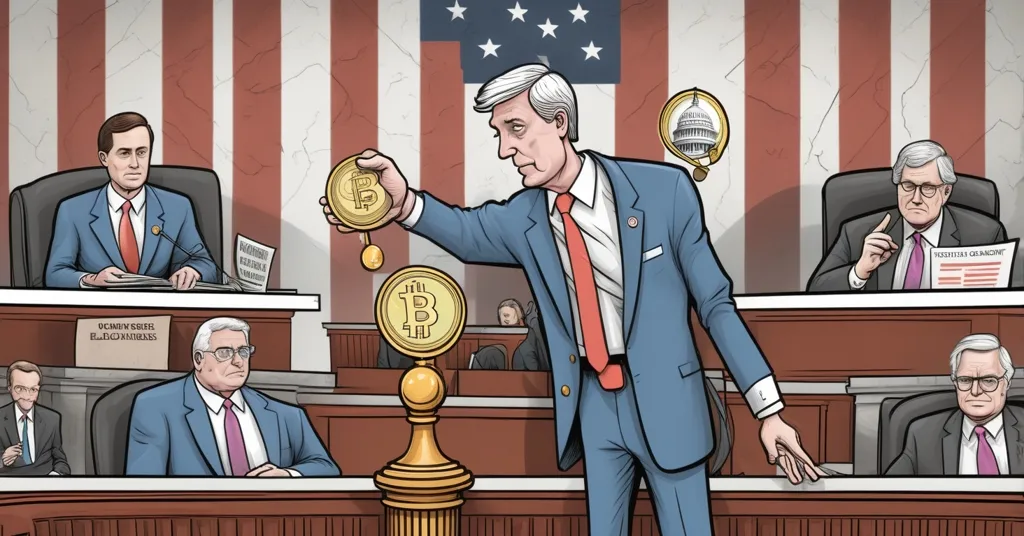Trump’s Crypto Ventures Spark Fierce US Regulation Debate

Trump Ties Ignite New Crypto Regulation Showdown
The U.S. Congress is grappling with heightened tensions over cryptocurrency regulation, fueled by former President Donald Trump’s involvement in the crypto industry. House Democrats and Republicans are sharply divided in their approaches, with rival roundtables highlighting their contrasting views on how to regulate digital assets.
- House Democrats and Republicans host opposing roundtables on crypto regulation.
- Democrats criticize Trump’s crypto ventures, including World Liberty Financial’s stablecoin and his family’s memecoins.
- Republicans advance legislative proposals like FIT 21 and a new draft bill to clarify regulatory frameworks.
- Former CFTC Chair Timothy Massad suggests a collaborative regulatory approach.
Leading the charge from the Democratic side, Rep. Maxine Waters has been vocal in her criticism of Trump’s crypto ventures. She expressed her concerns over what she perceives as Republican complicity:
“I am deeply concerned that Republicans aren’t just ignoring Trump’s corruption—they are legitimizing it,” – Rep. Maxine Waters.
Trump’s involvement in the crypto space has been through his company World Liberty Financial, which launched a stablecoin (a type of cryptocurrency designed to maintain a stable value, often pegged to a fiat currency like the US dollar). Additionally, his family introduced a series of memecoins (cryptocurrencies typically started as a joke or for fun, often inspired by internet memes). These actions have stirred controversy and raised ethical questions about political figures profiting from volatile digital assets.
On the other side of the aisle, Republicans, led by figures like Rep. French Hill, are focusing on advancing legislative proposals to establish clearer regulatory frameworks. Hill emphasized a more collaborative approach:
“We’re approaching it in a fresh way. To my friends on the other side of the aisle, our doors are always open,” – Rep. French Hill.
Their efforts include supporting the FIT 21 bill (Financial Innovation and Technology for the 21st Century Act), which seeks to provide a market structure for digital assets, and a new draft bill intended to clearly define the responsibilities of the Commodity Futures Trading Commission (CFTC) and the Securities and Exchange Commission (SEC).
Amidst this political tug-of-war, former CFTC Chair Timothy Massad proposed a solution that could bridge the divide:
“It brings those two agencies together, which I think is very important,” – Timothy Massad.
Massad suggested the creation of a self-regulatory organization, jointly overseen by the SEC and CFTC, to impose order on the chaotic crypto space. Such a collaborative approach could potentially mitigate the influence of political personalities and focus on the technical and regulatory needs of the industry.
The urgency of crypto regulation is not lost on members of Congress. Rep. Angie Craig highlighted the need for action:
“Crypto isn’t going away. We have a responsibility to be part of the solution,” – Rep. Angie Craig.
The public spats between the House Financial Services and Agriculture Committees’ X accounts further underscore the heated nature of this debate. With Trump’s influence on the market, the need for clear and effective regulation has never been more pressing, making it a national priority to safeguard the financial system from potential fraud and corruption.
While Trump’s involvement in the crypto space may seem like a political hot potato, it’s also a regulatory minefield. The question remains: could this high-profile involvement spur the necessary regulatory action, or will it further entangle the already complex landscape of cryptocurrency regulation?
As we navigate this tumultuous terrain, it’s worth considering whether the involvement of political figures in crypto is inherently problematic, or if it could drive regulatory progress. After all, if the White House started a TikTok account for their dog, would it be any different from launching memecoins?
The battleground of crypto regulation in the U.S. is not just about politics; it’s about shaping the future of finance. The rapid growth of the crypto market, combined with the influence of high-profile figures like Trump, underscores the need for clear regulations to prevent fraud and corruption and ensure the stability and integrity of the financial system.
Key Takeaways and Questions
What is the main point of contention between Democrats and Republicans regarding crypto regulation?
The main contention involves Democrats’ criticism of Trump’s involvement in the crypto industry as corrupt, contrasted with Republicans’ focus on advancing legislative proposals like FIT 21 and a new draft bill to clarify regulatory roles for the CFTC and SEC.
What specific actions has Trump taken in the crypto industry that have caused controversy?
Trump has been involved through his company World Liberty Financial, which launched a stablecoin, and his family introduced a series of memecoins, raising ethical concerns about politicians profiting from volatile digital assets.
What legislative proposals are Republicans focusing on?
Republicans are focusing on the FIT 21 bill, aimed at providing a market structure for digital assets, and a new draft bill that proposes clearer roles for the CFTC and SEC, alongside enhanced disclosure requirements.
What collaborative approach did Timothy Massad suggest?
Massad proposed creating a self-regulatory organization jointly overseen by the SEC and CFTC to impose order on the crypto space and mitigate the influence of political personalities.
Why is crypto regulation considered a national priority?
Crypto regulation is a national priority due to the rapid growth of the crypto market, the influence of high-profile figures like Trump, and the need for clear regulations to prevent fraud and corruption, ensuring the stability and integrity of the financial system.



